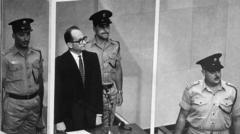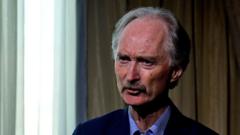Shalom Nagar, who hanged Nazi war criminal Adolf Eichmann in 1962, has died in his late 80s. A complex figure marked by the haunting memories of his duty, Nagar's experience and the historical context of Eichmann's execution raise questions about justice, memory, and the ethical dimensions of such acts.
Executor of Nazi War Criminal Eichmann, Shalom Nagar, Passes Away at 80

Executor of Nazi War Criminal Eichmann, Shalom Nagar, Passes Away at 80
Shalom Nagar, the prison guard who executed Adolf Eichmann in Israel, has died, reflecting on the emotional toll of his role in history.
Shalom Nagar, the man who executed Nazi war criminal Adolf Eichmann in 1962, has died in his late 80s, leaving behind a legacy intertwined with one of history’s most notorious figures.
Nagar, originally from Yemen and brought to Israel as an orphan in 1948, was serving as a prison guard at Ramle prison when he was chosen, not volunteered, for the solemn task of carrying out the execution of Eichmann. The haunting nature of this duty led to long-lasting nightmares and trauma.
Adolf Eichmann, a pivotal figure behind the implementation of the Holocaust through his role in the Final Solution, was captured by Israeli agents in Argentina in 1960 after living in obscurity post-World War II. His capture and subsequent trial were landmark events that captured global attention, highlighting the intersection of justice, memory, and the Holocaust’s legacy.
Eichmann was tried on extensive charges, including war crimes and crimes against humanity, and convicted after a trial that was groundbreaking for its media coverage and public engagement. He did not contest the reality of the Holocaust but claimed he was merely following orders.
Nagar's identity as Eichmann's hangman remained concealed for three decades out of fear for his safety, before being revealed by journalists in 1992. Following the execution, Nagar recounted the harrowing experience, including his struggle to perform the post-execution duties of handling Eichmann's remains. Over time, he experienced PTSD and turned to religion, ultimately resettling in the West Bank settlement of Kiryat Arba.
In 2010, a documentary titled "The Hangman" explored Nagar's life and the heavy burden he bore from this dark chapter in history. The death of Shalom Nagar not only marks the end of a personal history but also serves as a poignant reminder of a significant episode in the narrative of justice and morality following the Holocaust.

















